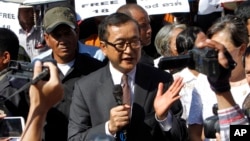Cambodia’s main opposition leader, Sam Rainsy, defended his self-imposed exile as “the only responsible choice,” on Wednesday in an op-ed published in a local English-language daily following ongoing criticism of the decision, this time by a prominent political analyst.
Over the past week opposition representatives and rights workers have faced legal threats over allegations of corruption that are the basis of an ongoing investigation into Rainsy’s deputy in the Cambodia National Rescue Party, Kem Sokha.
Rainsy decided not to return to Cambodia from a tour of Asia in November last year after an arrest warrant was issued by a Cambodian court over a years-old defamation case brought by the former foreign minister, Hor Namhong.
The opposition leader had accused Namhong of participating in crimes against humanity while running the notorious Boeung Trabek prison under the Khmer Rouge.
He was sentenced to two years in jail and fined $2,000; however, upon his return to Cambodia ahead of the 2013 election it was assumed he had received a pardon.
Ou Virak, head of the Future Forum, a think tank, had criticized Rainsy, saying he had lacked the courage to face jail.
“[T]he present situation might look different had Mr. Rainsy had the courage to return to Cambodia and stare down his jail sentence in November, as he promised to do in a public speech,” Virak said in the op-ed.
In Rainsy’s piece in the Cambodia Daily on Wednesday, he wrote that “a series of unexpected events” in November 2015, including the stripping of his parliamentary immunity when the warrant was issued, had led to the decision.
“I learned that an arrest warrant against me was issued that day in Phnom Penh in spite of my parliamentary immunity. I publicly said that day this would not change my plan to return to Cambodia on the 16th [of November] as had been scheduled,” he wrote, going on to say that the decision to revoke his immunity was meant to deprive him “of a defensive weapon for the legal battle I was preparing to conduct on the ground”.
He added that he was informed that there was a risk to the well-being of CNRP supporters who planned to meet him at the airport if he returned.
“What would another Cambodian opposition leader have decided on his return that day under such circumstances if he claims to be responsible?”







